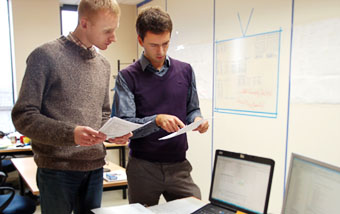Record contract to Omega Lithuania
Published: 07.12.11
The Omega team in Klaipeda recently secured the office’s largest contract to date and will be introducing Omega the waste management business in Lithuania.
Omega UAB, Lithuania

- Omega Lithuania was established in 2006 in Klaipeda city
- Has 16 employees to date, the majority of whom are software developers
- Recently signed its largest contract to date with the Klaipeda Regional Waste Center
- Will deliver a comprehensive system to be used by both the Klaipeda Regional Waste Center and the residents of Klaipeda
Five years after the establishment of the Klaipeda office, Omega's Lithuanian team has signed a contract with the Klaipeda Regional Waste Management Center, the office’s largest contract to date. The contract includes a significant number of assignments and will introduce many new users to Omega technologies. With this contract, Omega has also secured its first client in waste management.
Thousands of users in Klaipeda
The first step of the project will be to deliver a billing system to the Klaipeda Regional Waste Management Center, which will in turn be made available to many residents in the Klaipeda region.
“This system will not only be used by a large organization in the public sector, but it will also be made available to the common citizen; this means hundreds of thousands of users. Functionality will include billing overviews and the ability to make service requests,” says Vadim Naroznij, Omega UAB manager.
Comprehensive system
Fifteen of Omega Lithuania’s 16 employees are software developers. The project will employ several of the developers for a two-year period, and the billing system is only one part of a larger project enquiry from the Klaipeda Regional Waste Management Center.
“Our client is planning a larger information management system with several modules including accounting, analysis, personnel, salaries and document control," Vadim explains.
A new Omega product?
The contract with Klaipeda Regional Waste Management Center does not include adapting any of Omega's existing products for the client. Instead, the team will develop new applications based on Omega’s own software technology - AppFrame, and utilize the RAD methodology (Rapid Application Development).
The project will be a significant one for Omega for a number of reasons, Vadim suggests.
“Omega will keep its options open by adding this system to its existing product list, especially if we see potential in developing it and offering it to other similar companies. Until now, we have not engaged with many local Lithuanian projects. Most of our assignments have come from Omega in Norway or Omega's other offices. With this project, there may be a change in orientation for Omega UAB, going from an exporter of services to also becoming a company that contributes locally” says Vadim.